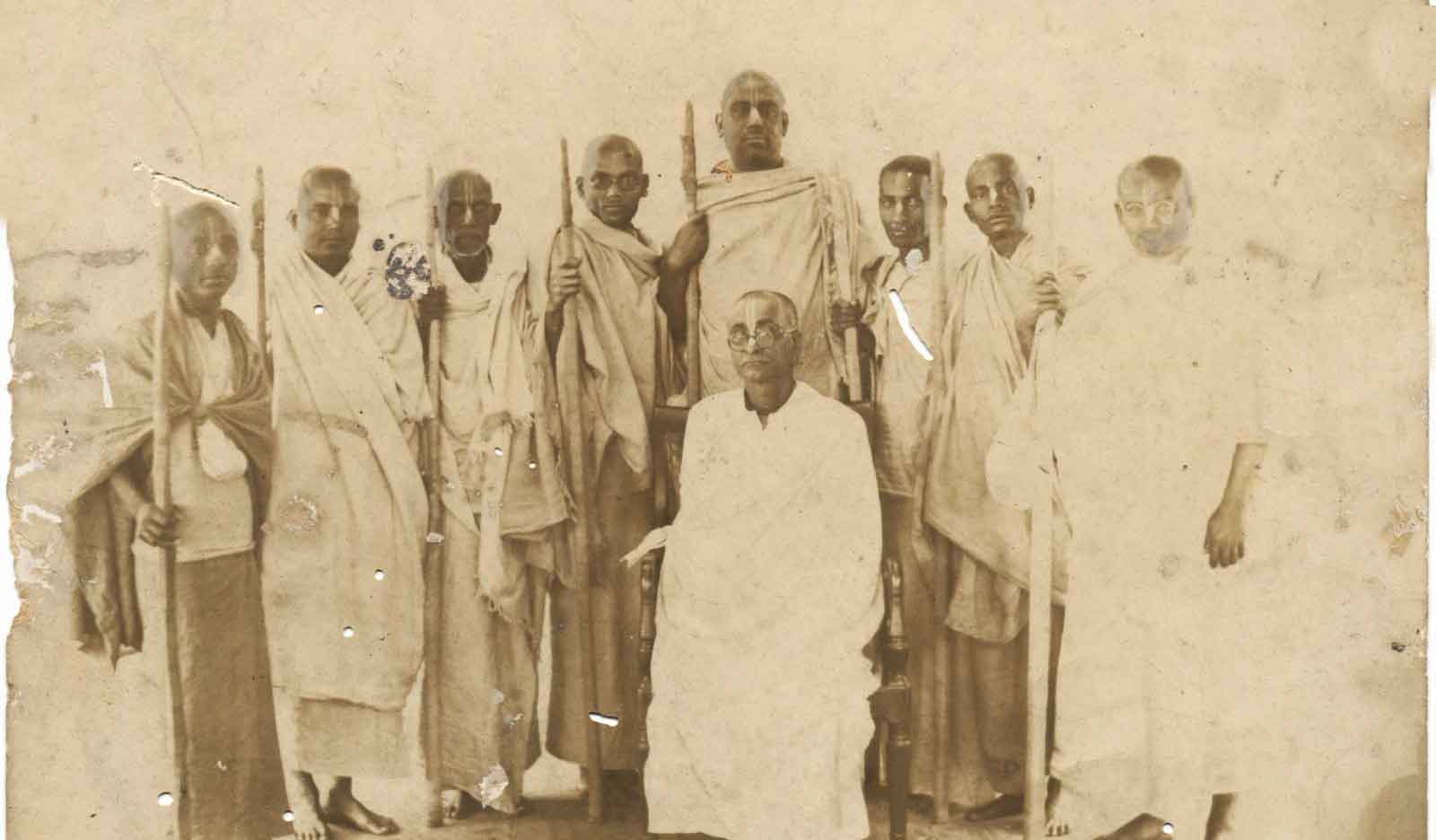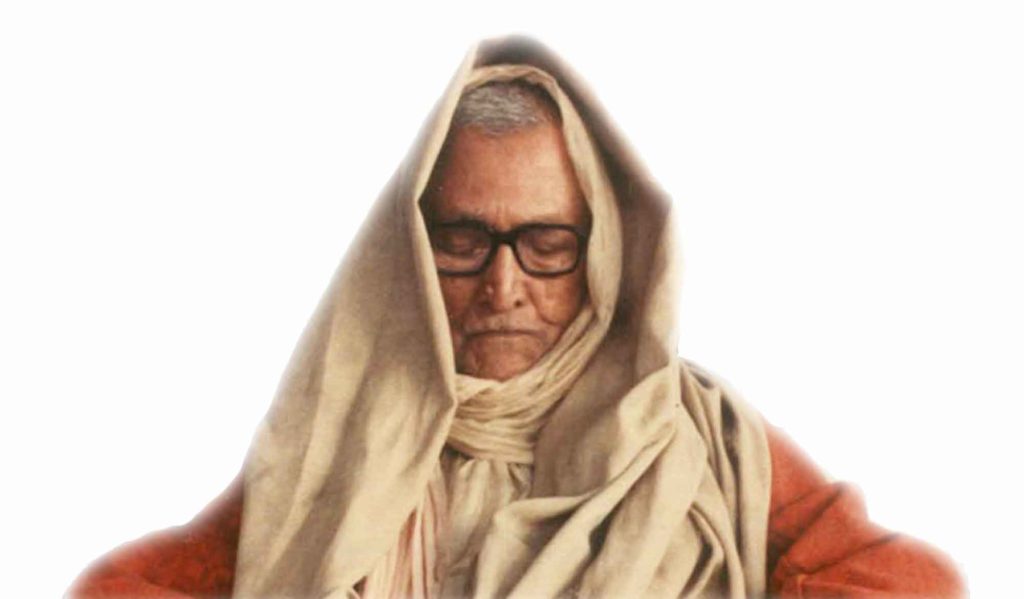Overview
In the following lecture which was first published in The Gauḍīya, Volume 11, No.22, January 1933, Śrīla Bhaktisiddhānta Sarasvati Ṭhākura describes the duties and position of a real tridaṇḍi-sannyāsī and delivers a scathing attack upon so-called sādhus and tridaṇḍis. This article was translated into English by Swami B.V. Giri.
At the end of December 1933, the Gauḍīya Maṭha in Dacca launched the transcendental diorama exhibition. Ācāryadeva Śrīla Sarasvatī Ṭhākura arrived in Dacca to participate in its opening. In the afternoon on December 24th, Śrīla Prabhupāda, surrounded by his close associates, began to speak about the position and duty of a tridaṇḍi-sannyāsī:
Atyāhāra (the urge to devour more or collect more than necessary) causes death to the living entity. Jihvopastha-jayo dhṛtiḥ (steadiness in conquering the urges of the tongue and genitals) — those who aspire for auspiciousness should abide by this śloka, but it should not be artificial as we see with the māyāvādīs and the false renunciants. The senses can only be conquered by cultivating a spirit of service. In a verse from his swan-like poetry, Śrīla Rūpa Gosvāmī Prabhu has told:
vāco vegaṁ manasaḥ krodha-vegaṁ
jihvā-vegam udaropastha-vegam
etān vegān yo viṣaheta dhīraḥ
sarvām apīmāṁ pṛthivīṁ sa śiṣyāt
“A self-controlled person who can overcome the impulses of speech, the mind, anger, the tongue, belly and genitals is qualified to instruct the whole world.” (Upadeśāmrta 1)
Śrīman Mahāprabhu has said:
grāmya-kathā nā śunibe, grāmya-vārtā nā kahibe
bhāla nā khāibe āra bhāla nā paribe
“Do not hear mundane talks and do not speak about mundane topics. Do not eat very palatable food, nor dress very luxuriously.” (Cc. Antya 6.236)
Songs about Śrī Rādhā-Govinda and mundane talks (grāmya–varta) are not the same thing. Songs about Nagna-Śyāmā (naked Kālī), folksongs about Śani, Satya-Nārāyaṇa, Ghetu Devī, Makala Devī, Cāṇḍī, Manasā Devī, songs about village gods etc, topics about worldly auspiciousness and inauspiciousness, sense-enjoyment or the dry renunciation of enjoyment are all considered to be mundane talks. And who engages in useless talks the most? The archeologists, epigraphists etc.
To conquer the urge of the tongue and genitals is called dhṛti. Those who have become tridaṇḍis have conquered their body, mind and words. News found in periodicals is full of mundane talks. It is impossible for tridaṇḍis to read such newspapers that report topics of the illusory world (māyā-kathā). By reading them the consciousness no longer cooperates and becomes an enemy to us. “So-and-so did this, so-and-so did that” – by reading such things, adversity and material desires are created. In the world of our dreams we long to become extremely rich with the desire to become respected for our wealth – thus the teachings of Cārvāka (the scholar of Bṛhaspati-Nyāya), Akbar and Jahangir’s teachings on royal pleasures, Napoleon’s teachings on bravery, Methuselah’s teachings of benevolence for all men etc. are greatly relished. We think that their advice will fulfil our dreams of becoming powerful. In this way Ṭhākura Mahāśaya has said:
rājāra ye rājya-pāṭa, yena natūyāra nāṭa
“A monarch’s kingdom is just like the dramatic performance of an actor. “(Prema-bhakti-candrikā 6.14)
The Highest Ideal is to Become a Tridaṇḍi
Those who are averse to devotion think, “I shall go on doing everything, but I shall not serve the Supreme Lord. Let idle gossip, narrow-minded ideas, and worldly affairs fill every second of my life.” By some means to achieve auspiciousness, they will build so many moats and fortresses for their protection. They argue that watering tulasī is a waste of time – it is better to spend both time and money in watering eggplants, because then they can eat more eggplants. But who will eat those eggplants? If monkeys take those eggplants, then they won’t be able to eat them, and if the monkeys steal them they will simply be forced to compete with them!
In human life, the highest ideal is to become a tridaṇḍi. The meaning of tridaṇḍi is one who does not demand respect for one’s self. He is respectful to others, he is tolerant and he glorifies Hari. The Vaiṣṇava is a demigod, yet he does not consider himself as a demigod. A tridaṇḍi means nirāśir-nirnamas-kriyāḥ – a tridaṇḍi does not bless anybody, nor does he accept any respects from anyone. But if one does not offer his respects to a tridaṇḍi and does not accept his blessing of kṛṣṇe matirastu (‘May you always remember Kṛṣṇa’), one must fast as atonement. As many times that one does not offer obeisance, that many times he should fast. It is the foremost duty of a brāhmaṇa to accept the tridaṇḍa.
The Worship of Demigods
By worshipping the demigods material obstacles will be destroyed, and one’s path for sense gratification thus becomes unhindered. Gaṇeśa removes the obstacles of the sensual worshipper, Sūrya removes the obstacles that hinder dharma (or puṇya). He removes darkness and gives light. Śakti gives mystical perfection to fulfil one’s desires. Rāvaṇa worshipped Śakti in order to kidnap Śītā. A worshipper of the material energy becomes close to Śakti and attains power and tries to steal the śakti from Śakti! Those that worship Rudra are able to perform all types of destructive activities. The worshippers of Gaṇeśa, Sūrya, Śakti and Rudra are all self-worshippers and iconoclasts.
Those that worship Viṣṇu do not ask for anything. In fact, Viṣṇu takes everything from the living entity. The devotees of Viṣṇu do not simply worship Him with sandalwood paste and flowers. Offering sandalwood paste and flowers means that they do not enjoy the fragrance for themselves. Some consider Viṣṇu as a temporary deity and imagine that by attaining perfection one may be able to destroy Kṛṣṇa. Such people think that Viṣṇu is simply one of the pañca-devatās and is a nonpermanent entity. This is against the conclusions of Vyāsa, and also against the conclusions of the Vedas. Vyāsa states:
viṣṇau sarveśvareśe tad-itara-sama-dhīr yasya vā nārakī saḥ
“Viṣṇu is the Supreme Controller of all. One who thinks otherwise is a resident of hell.” (Padma Purāṇa)
The Vedas say –
oṁ tad viṣṇo paramam padam
“The lotus feet of Viṣṇu are above all.” (Ṛg Veda 1.22.20)
Those that consider Viṣṇu and other demigods to be equal are impersonalists (nirviśeṣavādīs). The sūtra that these ‘killers of all gods’ continually chant is śivo’ham śivo’ham! (“I am Śiva, the destroyer of all”).
brahmacaryaṁ tapaḥ śaucaṁ santoṣo bhūta-sauhṛdam
gṛhasthasyāpy ṛtau gantuḥ sarveṣāṁ mad-upāsanam
“A householder should approach his wife at the proper time for begetting progeny. Otherwise he should practice celibacy, austerity and cleanliness. He should remain satisfied and cultivate friendship with all living beings. All living entities should worship Me.” (Bhāg. 11.18.43)
Only Viṣṇu should be worshipped without exception and all other fabricated deities that are worshipped and traded with are simply servants. One Kṛṣṇa is better than millions of others. By worshipping Him, all other worship is complete. O men! Gṛhasthas, brahmacārīs, vanaprasthas and sannyāsīs — you are all brāhmaṇas (descendants of Brahmā). Sarve brahmajā brāhmaṇas ca – Śrī Kṛṣṇa says, “Worship Me alone with everything you have; My service is your duty. You have no other duty than this. Your eyes, ears, mouth, nose – give everything in service to Me “.
Using the Tridaṇḍa to Make a Living
“O brother, If there is no mung-dahl then I will fast!” – these types are sādhus in name only. They cannot become real sādhus. Some people say: “In India there are 44 lakhs of sādhus who couldn’t collect the money to get married. Because they have no money to wash their clothes, they put on saffron cloth.”
Renunciation of the world, abstention, austerities and so forth are not the symptoms of a sādhu. The ant says, “Look, how much the elephant eats! I do not eat so much, I only eat a small amount.” Therefore, according to this logic, the ant is a great sādhu! But the elephant carries Kṛṣṇa on his back to Samanta-pañcaka, whereas the ant simply bites Kṛṣṇa. The elephant eats a large amount and carries and serves Kṛṣṇa, and the ant eats very little and only sinks his teeth into Kṛṣṇa. Many times we see ‘sannyāsīs’ who have renounced the use of eating from metal utensils living under a tree. But while living under a tree, all they have learned is how to smoke gāñja. If they had not become sannyāsīs for the sake of smoking gāñja and remained at home, they may well have been considered to be better renunciants.
Tridaṇḍam-upajīvati (accepting the tridaṇḍa in order to make a living) — “I have accepted shelter in the maṭha because here I can eat well.” If we accept the bhikṣu-āśrama in order to collect money, then the tridaṇḍa simply becomes an instrument for financial gain.
The rule of our Gauḍīya Maṭha is that sannyāsīs, brahmacārīs and vanaprasthas should not wear fancy clothes, should not possess footwear, should not collect even one penny for their personal needs. But they can collect money for vaiṣṇava–sevā. The activities of the 44 lakhs of so-called sādhus in India has nothing in common with the activities of Śrī Gauḍīya Maṭha.
In Śrī Gauḍīya Maṭha, the brahmacārīs, sannyāsīs etc. are all bhikṣus. I ask them to go out and beg. I alone have accepted the responsibility for this activity and in this work I will not bypass any house. Therefore I constantly send our men from door to door everywhere for bhikṣā. For our preaching of the Holy Name of Kṛṣṇa, for the sake of benefiting this world, we will approach everyone and accept something from them to use in Kṛṣṇa’s service. Simply to collect money and convert it into stool and urine is the occupation of monkeys, not of the Gauḍīya Maṭha. It is necessary to engage billions of Vaiṣṇavas — such a service is assigned to me.
There is the community of tridaṇḍi-sannyāsīs, and most of them belong to one and the same category. However, the paramahaṁsa is not amongst them – he is special. He does not belong to any community or class. He is of a very special category.
Are We Tridaṇḍis?
Our Professor Sanyal receives his salary and gives all of it for kṛṣṇa-sevā, so that we are not without money. So, is he a tridaṇḍi or are we tridaṇḍis? Go and collect food and money for Kṛṣṇa – then bring everything to me.
For the sake of pure hari-sevā and in order that pure hari-kathā will be preached in a straightforward manner throughout the world, I am ready to give our preachers thousands and thousands of motor cars. There is no objection to this. But why should somebody with a sensual mentality ride in a motorcar? He has no qualification to ride in a motorcar. He will simply become a viṣayī. One who does not want to serve Hari, Guru and Vaiṣṇava strongly desires to ride in a motorcar in order to be seen as a great person. Such a gross piece of flesh should not be allowed to drive in a motorcar because such a materialistic sense-enjoyer will simply ride that vehicle down the road leading to hell. He will simply turn it into a machine to make a living. What is the necessity for somebody to drive a car when they are not sincerely engaging their mind body and words in the worship of Hari, and when they are not giving everything to Hari, Guru and Vaiṣṇava? Moreover, the sahajiyā sampradāya will increase because we will have created another type, then we will certainly be destroyed.
Therefore I have made this proposal – tridaṇḍi-sannyāsīs! All of you please come to Ekāyana Gauḍīya Maṭha. Please do not do any more bhikṣā. I shall go out on mādhukarī–bhikṣā and feed you. Why do you wish to imitate me? I am not a tridaṇḍi. I am most fallen. You are not fallen – you are pāvana (saviours of the fallen). I have accepted you as my gurus, so why do you represent yourselves as something different? May the tridaṇḍi-bhikṣus use their body, mind and words at every moment in the service of Hari. With what hopes and with what expectations did we come to do hari-bhajana – and where have those hopes and expectations gone now?
(Translated by Swami B.V. Giri and Sanātana Dāsa)
Related Articles & Books
- 📖 The Meaning of the Sannyāsa Āśrama (Book)
- Markaṭa Vairāgī (Monkey Renunciates) by Śrīla Bhaktivinoda Ṭhākura
- Tridaṇḍi by Śrīla Bhaktisiddhānta Sarasvatī Ṭhākura
- The Colour for Sannyāsīs by Śrīla Bhakti Gaurava Narasiṅgha Mahārāja
- Bābājī Sannyāsa by Śrīla Bhakti Gaurava Narasiṅgha Mahārāja
- Sannyāsa Re-initiation by Śrīla Bhakti Gaurava Narasiṅgha Mahārāja
- Is Sannyāsa Forbidden in Kali-yuga? Swami B.V. Giri
- Parātma-niṣṭhā by Swami B.V. Giri
- Vairāgya (Renunciation) by Śrīla Bhaktivinoda Ṭhākura
- Bhek Dhāraṇa (Accepting the Dress of a Bābājī) by Śrīla Bhaktivinoda Ṭhākura
- Brahmacārī Āśrama by Śrīla Bhaktivinoda Ṭhākura
Further Reading
Prema Dhāma Deva Stotram with the Narasiṅgha Sevaka Commentary – Verses 61-65
In verses 61 to 65 of 'Prema Dhāma Deva Stotram', Śrīla Śrīdhara Mahārāja narrates the pastime of Śrī Caitanya at Caṭaka Parvata In Purī and explains how the scriptures produced by Brahmā and Śiva are ultimately searching for the personality of Mahāprabhu who is merciful too all jīvas, no matter what their social position.
Prabhupāda Śrīla Sarasvatī Ṭhākura’s Visit to Ayodhyā
With the forthcoming observance of Śrī Rāma Navamī, we present 'Prabhupāda Śrīla Sarasvatī Ṭhākura’s Visit to Ayodhyā' written by Śrīla Bhaktisiddhānta Sarasvatī Ṭhākura Prabhupāda from The Gaudīyā magazine, Vol 3. Issue 21/ In December 1924, after visiting Benares and Prāyāga, Sarasvatī Ṭhākura visited the birth-site of Śrī Rāmācandra in Ayodhyā.
Śaraṇāgati – The Only Path to Auspiciousness
In this article, 'Śaraṇāgati - The Only Path to Auspiciousness', Dhīra Lalitā Dāsī analyses the process of śaraṇāgati (surrender) beginning with śraddhā (faith). She also discusses the role of śāstra and the Vaiṣṇava in connection with surrender.
Ātma Samīkṣā – The Value of Introspection
In this article, "Ātma Samīkṣā – The Value of Introspection" Kalki Dāsa highlights the importance of introspection in the life of a devotee and especially in relation to the worldly environment that surrounds us. He also explains how transcendental sound influences our capacity to introspect.
Prema Dhāma Deva Stotram with the Narasiṅgha Sevaka Commentary – Verses 61-65
In verses 61 to 65 of 'Prema Dhāma Deva Stotram', Śrīla Śrīdhara Mahārāja narrates the pastime of Śrī Caitanya at Caṭaka Parvata In Purī and explains how the scriptures produced by Brahmā and Śiva are ultimately searching for the personality of Mahāprabhu who is merciful too all jīvas, no matter what their social position.
Prabhupāda Śrīla Sarasvatī Ṭhākura’s Visit to Ayodhyā
With the forthcoming observance of Śrī Rāma Navamī, we present 'Prabhupāda Śrīla Sarasvatī Ṭhākura’s Visit to Ayodhyā' written by Śrīla Bhaktisiddhānta Sarasvatī Ṭhākura Prabhupāda from The Gaudīyā magazine, Vol 3. Issue 21/ In December 1924, after visiting Benares and Prāyāga, Sarasvatī Ṭhākura visited the birth-site of Śrī Rāmācandra in Ayodhyā.
Śaraṇāgati – The Only Path to Auspiciousness
In this article, 'Śaraṇāgati - The Only Path to Auspiciousness', Dhīra Lalitā Dāsī analyses the process of śaraṇāgati (surrender) beginning with śraddhā (faith). She also discusses the role of śāstra and the Vaiṣṇava in connection with surrender.
Ātma Samīkṣā – The Value of Introspection
In this article, "Ātma Samīkṣā – The Value of Introspection" Kalki Dāsa highlights the importance of introspection in the life of a devotee and especially in relation to the worldly environment that surrounds us. He also explains how transcendental sound influences our capacity to introspect.








